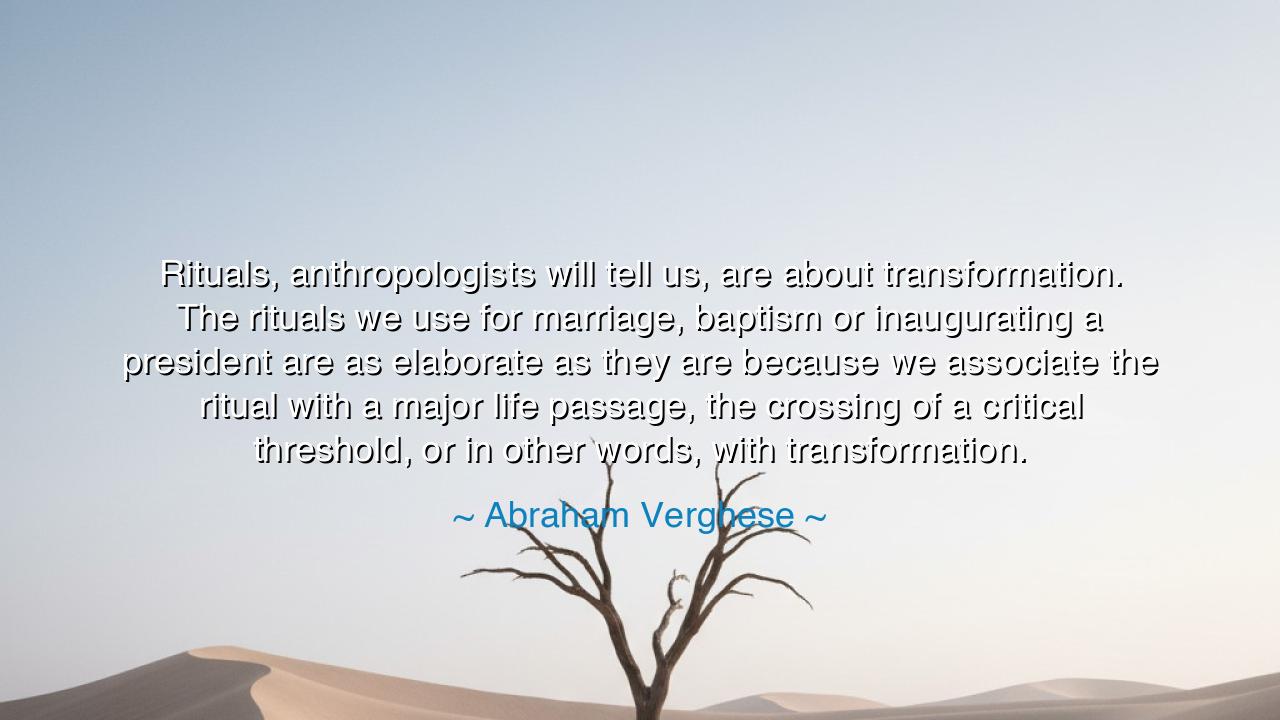
Rituals, anthropologists will tell us, are about transformation.
Rituals, anthropologists will tell us, are about transformation. The rituals we use for marriage, baptism or inaugurating a president are as elaborate as they are because we associate the ritual with a major life passage, the crossing of a critical threshold, or in other words, with transformation.






Hear, O seeker, the words of Abraham Verghese, who reminds us of the ancient truth: “Rituals, anthropologists will tell us, are about transformation. The rituals we use for marriage, baptism or inaugurating a president are as elaborate as they are because we associate the ritual with a major life passage, the crossing of a critical threshold, or in other words, with transformation.” These words carry the wisdom of generations, for they reveal that ritual is not mere ceremony, not empty gesture, but the vessel through which humanity sanctifies change and gives meaning to the turning of life’s great wheels.
From the dawn of time, men and women have feared and revered the moments when one state of life ends and another begins. Birth, marriage, death, kingship, victory—these are thresholds, and the soul trembles at their crossing. Rituals give order to that trembling. They clothe the unknown in song, prayer, and symbol, so that chaos may be transformed into meaning. Without ritual, the great changes of life would be raw and terrifying; with ritual, they are made sacred, a bridge between what was and what shall be.
Consider the union of two souls in marriage. The rite may differ—rings exchanged, hands bound, vows spoken before fire or altar—but in all lands the ritual declares the same transformation: two who were apart are now one. Without the ritual, the change might remain invisible, uncertain. With it, the couple is marked, and all who witness bear testimony. Thus, ritual is not only for the one who crosses the threshold, but for the community that surrounds them, so all may walk together into the new reality.
So it is also in baptism, when the child or believer is washed and given new identity. The water cleanses not the body alone, but the spirit, symbolizing death to an old life and rebirth to a new one. Without this ritual, the change would dwell only in the heart, unseen and unacknowledged. With it, the individual is proclaimed before heaven and earth as transformed, belonging not only to themselves but to the people of faith.
Even in the halls of nations, ritual reigns. Inaugurating a president, as Verghese names, is not simply the transfer of office but the transformation of a mortal into the bearer of a people’s destiny. The oath upon sacred text, the procession, the speech—these are the rites that elevate one person beyond their individuality and bind them to the fate of millions. So too it was in ancient times, when kings were anointed with oil or crowned with laurel, crossing from private man to public symbol. The ritual made visible the invisible change.
One may think these rites excessive, elaborate, unnecessary. Yet history shows that when ritual is stripped away, transformation loses its weight. In the French Revolution, when crowns and anointings were cast aside, leaders rose and fell with dizzying speed, and the people hungered still for symbols of permanence. For ritual speaks not to reason alone but to the deep places of the human soul, where symbols breathe and meaning lives. Without ritual, the heart cannot fully grasp the magnitude of change.
What, then, is the lesson? That you, too, must honor the rituals of your life. Do not dismiss the wedding, the funeral, the oath, or the ceremony as mere formality. They are the markers of your passage, the seals of your transformation. Create rituals even in small things—mark the beginning of journeys, the end of struggles, the birth of new dreams. In doing so, you give your life a rhythm that echoes eternity, and you teach your children to see the sacred in the everyday.
Thus, carry Verghese’s wisdom with you. When you cross a threshold, do so not in silence but in song, not alone but with others, not hastily but with reverence. For ritual is the fire that lights the path from who you were to who you are becoming. Embrace it, and your transformations will not be fleeting, but lasting, woven into the tapestry of memory and the story of your people.






AAdministratorAdministrator
Welcome, honored guests. Please leave a comment, we will respond soon